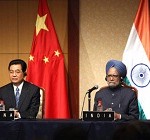The attacks in the Xinjiang region of China have put an unlikely strain on the China-Pakistan relationship, with China alleging that the extremists behind the attacks received training in Pakistan. In such a situation, India must review its own relations with China.
Ambassador Vinod C. Khanna, a specialist on China, and former Indian ambassador to Cuba, Indonesia and Bhutan speaks to Gateway House’s Madhura Joshion India’s Look East Policy, the importance of the Shanghai Cooperation Organisation (SCO) and the steps both countries should adopt to broaden their association.
Q. Can you comment on India’s Look East policy? What steps has India taken and what steps can it take further to revitalize it?
It is clearly in India’s interests to have a very close relationship with an area, with which it has had a long historical association with and which is today of great importance to its political and economic interests. Sufficient attention was, perhaps, not given to this region before. Therefore, interaction, whether in terms of bilateral relations with countries to the east of India or through participation in multilateral fora particularly in the multi-layered Association of South East Asian Nations (ASEAN) based structures, will be very beneficial. India today is there in whatever way we can, given our limited resources. This interaction will be good for the region as well as India.
Q. Can our Look East policy be used to balance China’s growing influence in the region?
Though I do not quite see India’s Look East policy simply in competitive terms with China but the fact is that China is a much bigger economy than India, and the economic relations of the East Asian countries with China are much larger and deeper than their relations with India. We have to accept that as a fact and work and operate on that basis. However, I don’t regard this as a terrible short coming.
Q. Do you see the Shanghai Cooperation Organisation (SCO) as playing a larger economic and strategic role in the region? Do you see it becoming the North Atlantic Treaty Organisation (NATO) of Asia?
I think that SCO is an important organization though I would not really compare it to NATO. NATO is a military alliance which was originally designed to be against Soviet Union. If SCO is meant to be against anybody in particular, then we are talking about a different kind of creature. Some see it as against U.S.-led West, if that was the case then why would India want to be a part of it? At the moment there is a different military organization, the Collective Security Treaty Organisation, involving Russia and some of the other former Soviet Union countries of which China and India are not members and that is a nearer equivalent of NATO. I think, SCO is already important and has the potential for becoming more important. Just the geographical area it covers, the resources of the area, the issues and problems here are so vast that a forum where the member countries can sit down and talk and cooperate is important. I hope that it never becomes a NATO style organization.
Q. Do you see China’s position on Kashmir and Arunachal Pradesh as being an impediment in the future for the relations both economic and political between India and China?
I think that these are very important issues, and they are obstacles to the optimal relationship between India and China. Having said that, both countries have the maturity to be able to still try and build a meaningful positive relationship. These issues cannot be ignored. I am afraid, the problem is pertinent. You cannot have a situation where China on one hand calls Arunachal Pradesh as Southern Tibet and on the other hand says one can put it aside and not worry about it; it is unreal. But having accepted the existence of a problem, we have to keep talking about it, and build walls of understanding to ensure that things don’t blow out of proportion. We must continue to build other mutually beneficial relationships despite these problems.
Q. What are the three steps should India take to strengthen its relations with China?
India has much to gain from building upon its relations with China and vice-versa. To strengthen the relationship, India must work on a strategic understanding with China; it cannot sleep on “security” issues.
The proper way of reacting to China’s so-called string of pearls around India is to build such good relations with countries that China cannot use against India.
A synergy is required between India and China in multilateral fora where both countries are members. Indo-Chinese agreements on larger multilateral issues will have a stronger impact on their relations, and will have a beneficial effect on the region and the world as a whole.
Ambassador Vinod C. Khanna is a specialist on China, and former Indian ambassador to Cuba, Indonesia and Bhutan.
Madhura Joshi is a researcher at Gateway House.
This interview was exclusively conducted for Gateway House: Indian Council on Global Relations. You can read more exclusive content here.
For interview requests with the author, or for permission to republish, please contact outreach@gatewayhouse.in.
© Copyright 2011 Gateway House: Indian Council on Global Relations. All rights reserved. Any unauthorized copying or reproduction is strictly prohibited.


